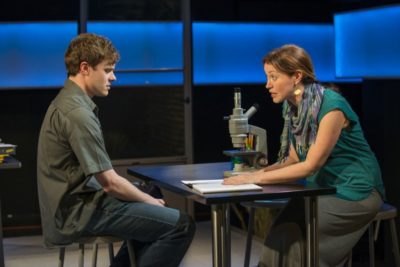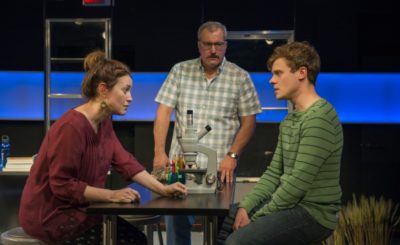How the World Began
Directed by Keira Fromm
Produced by Rivendell Theatre Ensemble
An Emotionally-Stirring and Thought-Provoking Play For Believers and Non-Believers Alike
At first glance, How the World Began seems like a problem play – essentially: a play about a contentious social issue – in this case, about the apparent antagonism between science and faith. And, for me, problem plays are . . . well, a problem. That is because when politics, the seething pool of opinion, takes the stage, truth, the essence of art, often languishes in the wings while opinion is bandied about by stereotyped characters in contrived situations until, inevitably, the popular opinion prevails with the last word. Fortunately – and to my happy delight – How the World Began turns out not to be such a play and mostly manages to avoid such a formula, instead attending to how, when personal beliefs meet personal biases, communication breaks down and no one is “right.”
How the World Began tells the story of Susan Pierce (Rebecca Spence), a high school biology teacher who relocates from the big city of New York to the small town of Plainview, Kansas to rebuild her life. Shortly after her arrival, however, she finds that she has offended a few students by an off-handed comment she made during her lecture on the origin of life. Enter Micah Staab (Curtis Edward Jackson), a physically stilted but seemingly rationale young man and – in the truest sense of the word – a true, Christian believer. Micah confronts Susan about her comment in an attempt to understand exactly what she meant by it.
Their initial conversation having ended uneasily, Gene Dinkel (Keith Kupferer), a more scientifically “enlightened” Christian, steps in to try to ameliorate the situation. Although the simple, good-natured man is neither Micah’s guardian nor his relative, Gene attempts to explain to Susan why, given Micah’s recent family tragedy, she should apologize to him – even though she denies that the comment was directed at Christianity, per se. Susan’s apology fails to appease Micah’s issues with her comment, however, and Susan soon finds herself the target of terrorization and slander, which eventually leads to the defeat of both of their principled stances.
What saves How the World Began from the hackneyed pitfalls of the contemporary problem play is that no character comes away clean. From the beginning, one will probably find him or herself siding with either Susan or Micah, either seeing the one as brazen and the other as humble or the one as innocent and the other as irritatingly persistent. But to ultimately deny the flaws that each of these characters possess would be just the self-righteous self-delusion the play intends the audience to question in themselves. (Though, that being said, one audience member did continually applaud when Susan hurled flagrantly offensive words at Micah and Gene, so . . . know thyself.)
Another element of this production that elevates it from the ruts of the problem play is the phenomenal acting. Plays of this kind often repel me emotionally from the characters because the author’s agenda speaks so obviously through them that I’m constantly on the defensive, incredulous and insulted. However, although the acting teases the line of stereotype – the “cultured,” callous New Yorker, the obnoxiously naïve fundamentalist, the good-natured, mid-western yokel – the Equity actors succeed wonderfully in filling and rounding-out the characters to make them vivid representations of life: I alternatingly felt outrage, pity, and good humor toward them all – and, at times, my emotion was so great I nearly welled with tears.
While some dialogue sounds unnatural at times, and the ending certainly leaves something to ponder over, How the World Began offers an emotionally stirring story with substance for personal reflection – for men, women, Christians and non-believers alike.
Recommended
August Lysy
Playing at the Rivendell Theatre Ensemble, 5779 N. Ridge Avenue, Chicago. Tickets are $32 pre-sale and $35 walk-up for general admission; $22 pre-sale and $25 walk-up for students, seniors, active military, and veterans; and 5 seats are Pay What You Can each night, first come, first served. For tickets and information, call the Rivendell Theatre Ensemble box office at 773-334-7728



